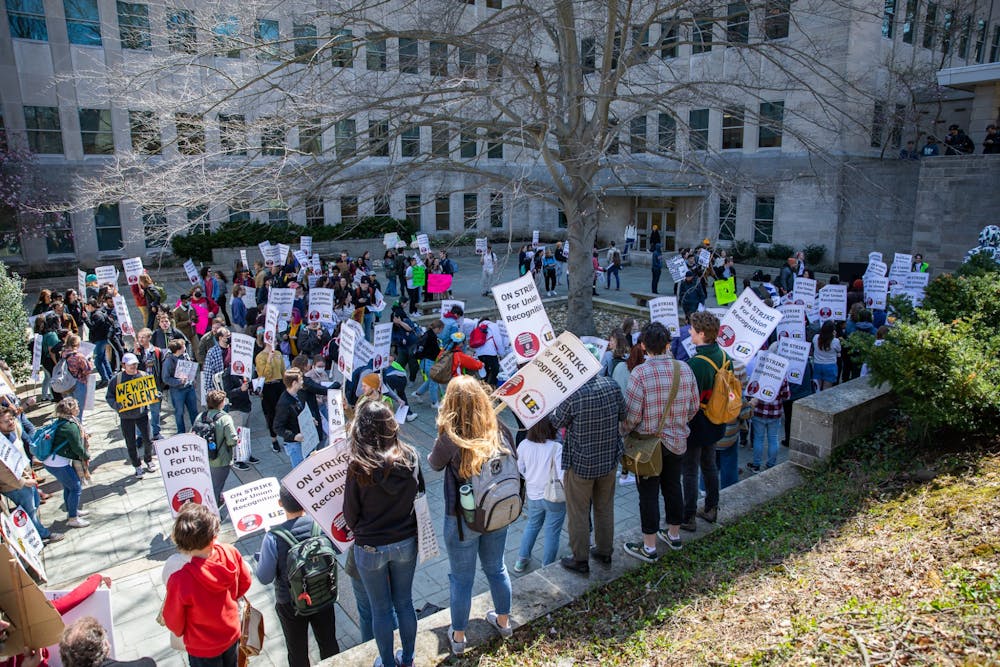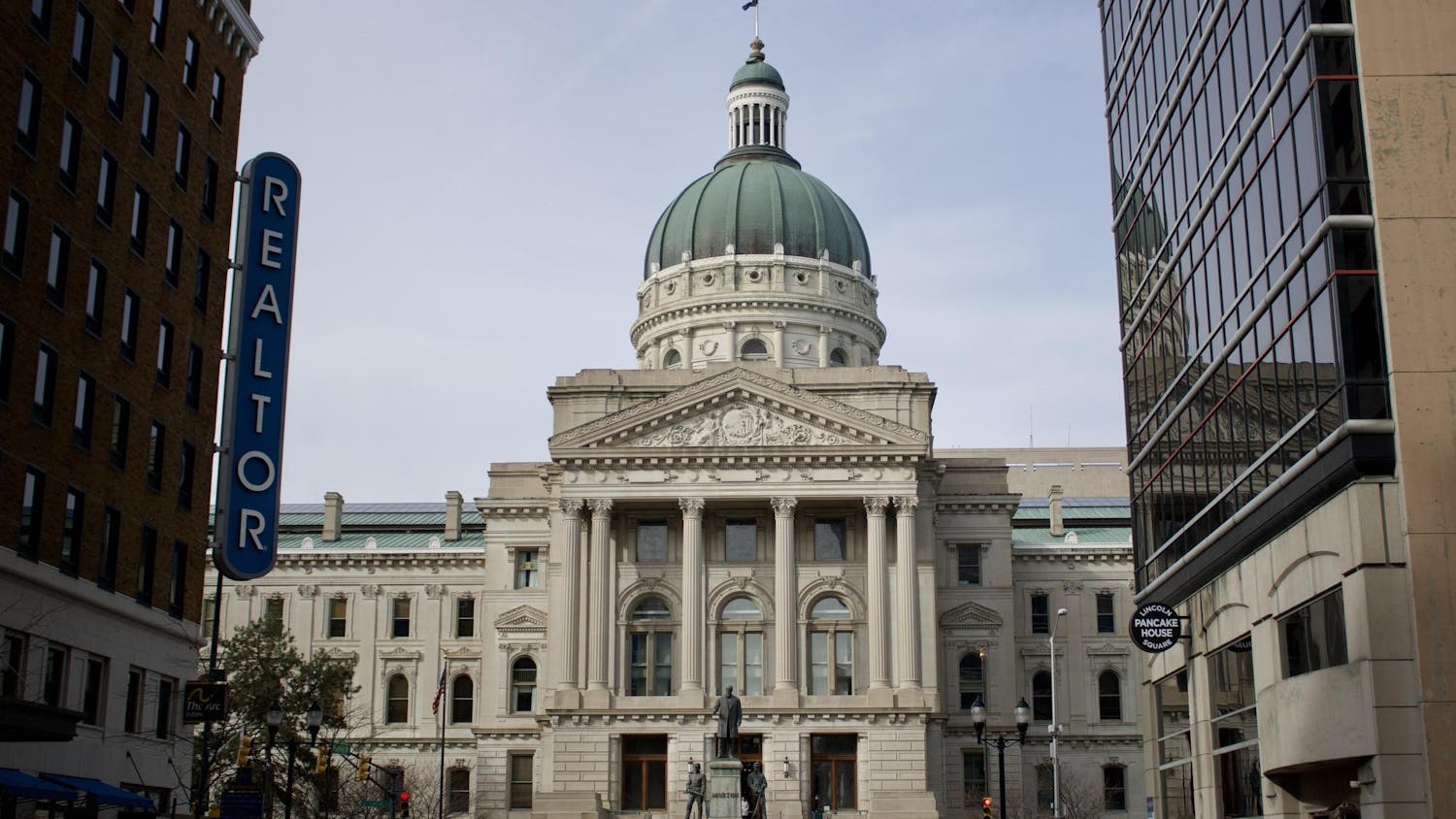The IU campus felt abnormally empty April 13. Some classes were canceled due to the graduate worker strike and the cold rain kept many students indoors.
But inside the Canterbury House, plans were forming.
In the room immediately to the left of the front door, a group of graduate students made phone calls asking people to join the picket lines Thursday. Further down the hall, boxes of donuts sat open on a kitchen table. Beyond the table, volunteers cooked soup for the protestors.
The Canterbury House serves as the headquarters for the Indiana Graduate Workers Coalition-United Electrical Workers. However, not everyone helping organize picketing efforts from the Canterbury House were graduate students.
IU freshman Steven Massey stood over a folding table in the basement of the Canterbury House on Wednesday afternoon making IGWC-UE buttons. The red circular pins read “living wage” at the top and “union yes!” at the bottom.
Massey, although not a graduate student himself, said he feels passionate about their cause because he comes from a low-income background. He knows what it is like to work nonstop and still worry about whether it's enough to pay the bills.
“I see graduate students struggling in the same way my family has,” Massey said.
Massey receives the maximum amount of funding offered through a Federal Pell Grant, a financial aid package offered to undergraduate students who display dire financial need. An email from Provost and Executive Vice President Rahul Shrivastav sent to IU faculty mentioned Pell Grant recipients could be disproportionately affected by the strike. The email said students’ eligibility for the grant could be jeopardized if graduate workers withhold final grades.
“The students who are on the margins often bear the greatest burden of such a work stoppage,” Shrivastav wrote in the email.
Massey is aware the university voiced concerns about the strike’s impact on his financial aid — and it only made him more adamant to stand with the graduate workers. The university is exploiting low-income and otherwise marginalized students’ fears in an attempt to pit them against graduate workers, Massey said.
“The picture they’re trying to paint is that grad students are letting us down, but if anything I think IU is letting us down,” Massey said.
Massey said he knows what it is like to attempt to live on an unlivable wage, unlike many of the administrators who he said are trying to intimidate Pell Grant recipients into opposing the graduate workers’ unionization. Massey expressed frustration that the people he interacts with and learns from on a daily basis earn drastically less money than administrators.
“They aren’t living in these conditions and they really don’t know what it’s like,” Massey said. “The notion that grad students have disappointed us is far from the truth.”
There is a long history of institutions engaging in union-busting tactics by fear mongering against people of color and people living on low-income wages, Massey said.
“I am definitely disappointed to see that IU makes these claims as much as it is a university that claims to value diversity and inclusion,” Massey said. “Their actions speak louder than their statements and words.”
IU spokesperson Chuck Carney said students who rely on federal financial assistance must demonstrate academic progress — something he said the graduate worker strike could threaten.
“By targeting a strike directly at undergraduate education and threatening to withhold the grades needed to show that progress, these graduate students are knowingly jeopardizing that financial aid for those who need it most,” Carney said.
Carney called the strike a disappointing attack targeted at undergraduate education.
“Nonetheless, each of our schools and departments have worked on contingency plans to ensure that disruption is minimized and our undergraduate students can successfully complete the semester, including our seniors who are finishing their final few courses,” Carney said.
As a member of the IGWC-UE Outreach team, graduate worker Bradi Heaberlin interacts directly with undergraduate students looking to get involved with the strike. She said many undergraduate students approach her with questions about the strike, but the vast majority express their support.
Heaberlin said she wants to make it clear the strike is not meant to punish undergraduates — it will actually help them in the long run by giving graduate workers more time and resources to dedicate to providing quality instruction.
“Undergraduates who are familiar with our efforts know that the quality of their education is inextricably linked to us receiving a living wage and having a seat at the table,” Heaberlin said.
Heaberlin helped organize the undergraduate walkout and rally April 14. In preparation, Heaberlin held an event where undergraduate students could make signs, banners and buttons to show their solidarity with graduate workers.
One of the most popular signs amongst undergraduates read “My tuition should pay a living wage.”
“A lot of undergraduates I’ve talked to, especially who work to pay for their own tuition, are frequently shocked to find that their tuition is not paying their educators a living wage,” Heaberlin said.
IU freshman Ava Tuschman said she felt surprised by a number of things when her instructor informed her professional writing skills class of the strike.
As an out-of-state student, Tuschman said she struggles to understand how her steep tuition does not afford her teachers a livable wage.
“I was shocked at the fact they weren’t getting paid enough because I feel like we pay so much for our tuition,” Tuschman said.
Tuschman said she thinks some people in her class may have felt annoyed by the strike because it is easiest to learn through in-person classroom instruction, but said the overall student reaction to her instructor’s strike announcement was supportive.
IU sophomore Jackson Bell, a student in the labor studies department, has been an active participant in the strike, leading a crowd of approximately 200 undergraduate students in a series of chants during the undergraduate walkout April 14.
“What’s disgusting?” Bell called.
“Union busting,” the crowd answered.
Bell became involved in the unionization efforts in fall 2021. He said his mission is to help undergraduate students understand the strike isn’t just a graduate worker issue — it affects the entire IU community.
“Some of my favorite professors are grad students, but I know that the quality of education is going to increase when they don’t have to do things like get a second job, get a third job, donate plasma,” Bell said.
Bell said the two most important factors that decide whether the strike succeeds or fails are undergraduate and faculty support.
“IU is ultimately an educational institution, but also a business,” Bell said. “You got to hit them where it hurts, which is the money.”
Bell said he thinks IU administration is making an effort to divide undergraduate and graduate students but he hopes it will not succeed.
Standing in the basement of the Canterbury House, Bell said he could look around and see people of all socioeconomic backgrounds, genders, races and sexual orientations working together.
“This is not a movement that excludes people,” Bell said. “The university is the one trying to exclude people. We want to make that loud and clear so that undergrad students and grad students are not divided.”




